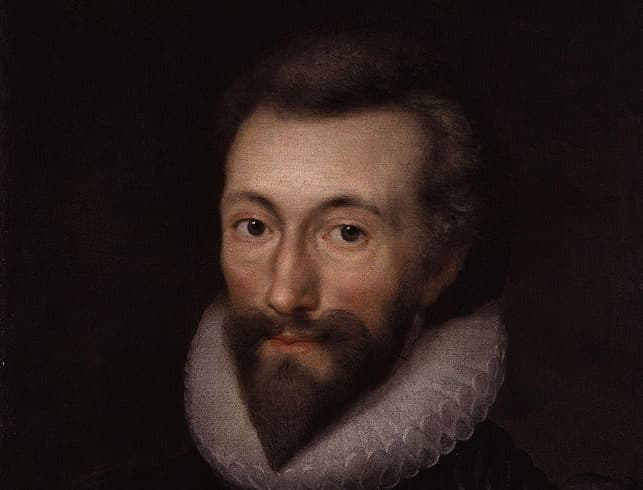Poem of the Day: ‘Air and Angels’
The poems of John Donne are marvels of mental engineering, balancing extended constructions on a single striking conceit, as one might build a cathedral on the foundation of a single Lego brick.

Among the knotty metaphysical poets who populated the first literary generation after Shakespeare, John Donne (1572–1631) is easily the knottiest. His poems are marvels of mental engineering, balancing extended constructions on a single striking conceit, as one might build a cathedral on the foundation of a single Lego brick. Today’s Poem of the Day, “Air and Angels,” is no exception.
Characteristically, even on the level of its form, “Air and Angels” is a love-knot of a poem. Each of its two stanzas constitutes a sonnet, albeit a quirky one. The rhyme scheme begins, in the first stanza, by suggesting a Petrarchan sonnet, with an abba quatrain, but quickly complicates the reader’s expectations by making the quatrain a sestet: abbaab. A quintain follows, cdcdd, and a final tercet, eee. The meter, too, through both stanzas, shifts from tetrameter to pentameter, then contracts to trimeter in line twelve of each stanza. At every moment, the form itself refuses to lull us with its regularity, but instead presses itself on our attention.
But then so does the poem’s thought process, inextricable from the form. It begins with the idea of love as a sacramental presence, everywhere invisible and incorporeal, as angels are. Met with a particular you, however, the poem’s speaker modifies this initial idea. As his soul’s “parent” and creator is not merely love, but love incarnate, so he accepts the necessity of his own body — his own embodiedness — as also expressive of love, as is his beloved’s body. She may be like an angel, but she is not an angel. Love, for the two of them, is suddenly not only transcendent, but immanent. It is somewhere in particular, and something in particular. It is someone in particular. Though it lives and moves in a larger element, human love has, and is, matter.
This epiphany brings us to the end of the first sonnet-stanza. It might seem to us to be epiphany enough. But Donne, unsatisfied, presses on. Having identified love as something universal and spiritual, but also something particular and incarnate, he proceeds to parse the structure of the particular love, between the two embodied people. Again the angel conceit presents itself: angels are like air, but they aren’t air. The two exist in relationship. One forms an element, and the other, though it’s like the first, moves within it, as the earth turns at the center of its atmosphere. “So thy love may be my love’s sphere,” he says. Her love wears his love as angels wear the air.
Air and Angels
by John Donne
Twice or thrice had I lov’d thee,
Before I knew thy face or name;
So in a voice, so in a shapeless flame
Angels affect us oft, and worshipp’d be;
Still when, to where thou wert, I came,
Some lovely glorious nothing I did see.
But since my soul, whose child love is,
Takes limbs of flesh, and else could nothing do,
More subtle than the parent is
Love must not be, but take a body too;
And therefore what thou wert, and who,
I bid Love ask, and now
That it assume thy body, I allow,
And fix itself in thy lip, eye, and brow.
Whilst thus to ballast love I thought,
And so more steadily to have gone,
With wares which would sink admiration,
I saw I had love’s pinnace overfraught;
Ev’ry thy hair for love to work upon
Is much too much, some fitter must be sought;
For, nor in nothing, nor in things
Extreme, and scatt’ring bright, can love inhere;
Then, as an angel, face, and wings
Of air, not pure as it, yet pure, doth wear,
So thy love may be my love’s sphere;
Just such disparity
As is ‘twixt air and angels’ purity,
‘Twixt women’s love, and men’s, will ever be.
___________________________________________
With “Poem of the Day,” The New York Sun offers a daily portion of verse selected by Joseph Bottum with the help of the North Carolina poet Sally Thomas, the Sun’s associate poetry editor. Tied to the day, or the season, or just individual taste, the poems will be typically drawn from the lesser-known portion of the history of English verse. In the coming months we will be reaching out to contemporary poets for examples of current, primarily formalist work, to show that poetry can still serve as a delight to the ear, an instruction to the mind, and a tonic for the soul.
